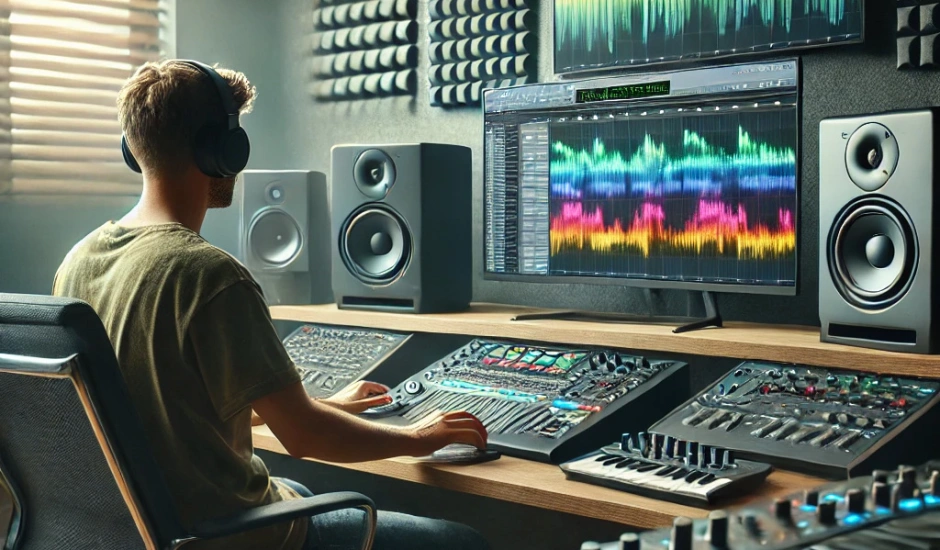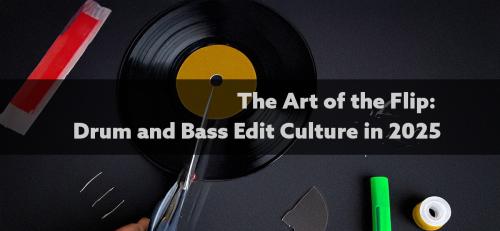
How to Get Your Drum & Bass Track Signed to a Label (2025 Guide)
Breaking into the Drum & Bass scene and landing a release on a respected label is a major milestone for producers. Whether you’re aiming for an imprint like Hospital Records, Critical Music, or RAM, or considering self-releasing with DistroKid, this in-depth guide covers everything you need to know to get your music heard and signed.
TL;DR – Crafting a Demo That Labels Notice:
- Only Your Best Work: Send 1–3 polished, finished tracks that fit the label’s style.
- Mastered Quality: Use tools like FabFilter Pro-Q 3 and iZotope Ozone or hire a pro.
- SoundCloud Private Links: Industry standard with downloads enabled.
- Concise Artist Bio & EPK: Short bio, socials, and previous releases.
Avoid Mistakes:
- No unfinished tracks or long, unfocused emails.
- Stick to one genre per submission.
- Personalise emails and follow label submission rules.
Pro Tip: Test tracks on multiple sound systems before sending.
Know What Labels Want in 2025
The Drum and Bass landscape continues to evolve, but certain essentials remain timeless. In 2025, labels are looking for more than just great tracks—they’re seeking well-rounded artists who can make an impact on the scene. Here’s what’s catching their attention:
Impeccable Production Quality
With more producers than ever vying for label attention, crystal-clear mixdowns and polished arrangements are non-negotiable. Labels want tracks that are ready for the dancefloor and radio alike—no additional mastering required. Focus on punchy drums, rich basslines, and well-balanced dynamics to ensure your production stands out.
A Unique Sound and Artistic Identity
In a saturated scene, originality wins. Whether you’re crafting soulful Liquid rollers, deep Jungle cuts, or dark Techstep bangers, your music should carry a signature style. Labels are drawn to producers who push boundaries, blend subgenres, or bring fresh textures to classic sounds. Don’t be afraid to experiment—sometimes, it’s the unexpected that gets signed.
Strong Online Presence and Engagement
In 2025, having a social media buzz can make all the difference. Labels are increasingly scouting producers who can build momentum on platforms like TikTok, SoundCloud, and Instagram. Engage with your audience through track previews, studio snippets, and live streams. Viral moments, fan engagement, and playlist placements all signal that your music resonates—and labels take notice.
Live Performance Potential
Today’s labels aren’t just looking for producers—they’re seeking future headliners. The ability to perform live sets or DJ with confidence can set you apart. Practice blending your tracks seamlessly, craft memorable live sets, and showcase your skills through online mixes or live streams. A strong live presence not only boosts your profile but also opens doors for label showcases and festival bookings.
Current Trends in Drum & Bass (2025)
Liquid and Minimal Rollers: Smooth, melodic Liquid and stripped-back Minimal Rollers are dominating playlists and DJ sets. Their versatility makes them a staple in sets ranging from sunset sessions to peak-time club nights. Labels are especially keen on tracks that blend soulful vibes with crisp percussion and deep subs, as these tunes often resonate with both casual listeners and hardcore heads.
Jungle Revival: The resurgence of Jungle continues to thrive, with old-school breaks, chopped amens, and warm 808 basslines making a strong comeback. Labels are embracing this nostalgic sound, often with a modern twist—combining raw breakbeats with polished production techniques. Expect more Jungle-infused releases on both major and underground imprints, as well as cross-genre blends with footwork and breaks.
Deep Tech and Halftime Grooves: The darker, moodier side of Drum & Bass is growing in popularity, especially on forward-thinking labels like 1985 Music, The North Quarter, and UVB-76. Deep Tech tracks with stripped-down, minimalistic structures and Halftime rhythms with off-kilter beats are drawing attention for their cinematic, immersive qualities. This subgenre is particularly popular in intimate venues and on curated mix series.
Experimental and Leftfield Sounds: Labels are increasingly open to boundary-pushing sounds that challenge the conventional DnB formula. From glitchy textures to ambient intros and sudden tempo shifts, experimental producers are carving out a space for more avant-garde expressions within the genre.
Dubwise and Reggae Influences: With the continued influence of sound system culture, Dubwise DnB with deep basslines, echoing delays, and reggae vocals is making waves on the festival circuit. This substyle is highly sought after for its ability to bring warmth and energy to sets.
Vocal-Driven Tracks: There’s a growing demand for vocal collaborations, especially soulful hooks and powerful MC performances. Vocal-led DnB is connecting with wider audiences, gaining traction on streaming platforms, and being pushed by labels aiming for crossover success.
DNB x Garage Fusion: Hybrid tracks that blend DnB energy with UK Garage grooves are gaining traction, offering producers new ways to experiment with rhythmic patterns and swing-heavy beats.
These trends are shaping the current direction of Drum & Bass, offering producers multiple lanes to explore while appealing to the evolving tastes of labels and audiences alike.
What to Include in Your Demo:
1. Only Your Best Work (1–3 Finished Tracks)
Quality always trumps quantity. Choose 1–3 tracks that best showcase your sound and fit the label’s style. Ensure they are finished, polished, and ready for release. If a label likes your music, they’ll ask for more—so leave them wanting.
2. Mastered Quality and Industry-Standard Sound
Labels expect tracks that are ready for the club, radio, and streaming platforms. Invest in proper mixing and mastering to achieve a clean, punchy sound. Use trusted industry tools like:
-
FabFilter Pro-Q 3 (for precise EQ)
-
iZotope Ozone (for professional mastering)
-
Waves SSL plugins (for warm, analogue-style compression)
If mastering isn’t your forte, consider using a professional engineer or a trusted online mastering service.
3. SoundCloud Private Links (with Downloads Enabled)
SoundCloud remains the industry standard for demo submissions due to its easy playback and sharing options. Use a private link, enable downloads, and ensure the tracks are properly tagged with your artist name and track title. Add timestamps for standout moments if you want to highlight key drops or switch-ups.
4. Concise Artist Bio with Social Links and EPK
Keep your introduction brief but impactful. Include a short bio that covers who you are, your production style, and any notable releases or DJ sets. Attach an EPK (Electronic Press Kit) if you have one, including:
- Links to your socials (Instagram, SoundCloud, Spotify)
- Press photos or logo
- Previous releases or mixes
- Any notable collaborations or radio play
Mistakes to Avoid:
1. Sending Unfinished or Unmastered Tracks
If your track isn’t ready to be played in a club or on the radio, it’s not ready for submission. Labels want fully polished music, not works in progress.
2. Writing Long Emails Without Direct Links
Keep your email short and professional. Get to the point quickly and include clickable links to your demo. Avoid attaching large files—streaming links are preferred.
3. Submitting Multiple Genres Without Focus|
Labels want to understand your sound. Sending tracks in different styles (e.g., Liquid, Jump-Up, and Techstep in one email) can confuse A&Rs. If you produce multiple subgenres, pick the ones that best fit the label you’re submitting to.
4. Being Overly Generic or Copy-Pasting Emails
A&R teams can spot a mass email from a mile away. Personalise your submission: mention why you’re submitting to their label specifically and show that you understand their vibe.
5. Ignoring Submission Guidelines
Many labels have specific submission instructions on their websites. Whether they request a particular format, subject line, or platform, follow their guidelines to the letter. Ignoring instructions can get your demo skipped immediately.
Pro Tip: Test Your Tracks First
Before submitting, test your tracks on different sound systems—headphones, car speakers, and club sound systems if possible. Make adjustments based on how they translate across these settings.
Final Thought:
A demo is your first impression—make it count. Show labels that you’re not just a producer but a professional artist ready for the next level. By following these guidelines, you’ll significantly improve your chances of landing on their radar.
Drum & Bass Labels Accepting Demos (2025)
Research each label’s style before submitting:
- Hospital Records: Demo portal on their website.
- Shogun Audio: Accepts submissions directly.
- Critical Music: Email-based submissions.
- 1985 Music: Best for deep, halftime sounds.
- RAM Records: Prefers mastered, club-ready tracks.
Label Submission Tips:
- Personalise your email with why you chose the label.
- Follow their submission rules precisely.
Building Connections Within the Scene
Networking is crucial. Many signings come from relationships, not cold demos.
Best Ways to Network:
- Attend UK Events: FabricLive, Boomtown, and Hospitality.
- Join Online Communities: Engage on Discord and Reddit (/r/DrumandBass).
- Collaborate with Other Producers: Remixes are great entry points.
- Participate in Remix Competitions: Many labels sign winners.
Self-Releasing with DistroKid: Build Your Profile
Self-releasing can be your path to visibility and leverage for future label signings.
Get 7% off DistroKid: distrokid.com/vip/seven/8904607
Advantages of Self-Releasing:
- 100% Royalties: Keep all your earnings.
- Speed: Instant release on all platforms.
- Smart Tools: Pre-save campaigns and royalty splits.
Using DistroKid to Grow Your Brand:
- Spotify for Artists: Get verified instantly.
- Music Video Distribution: Push your tracks to YouTube.
- Takedown Control: Quickly remove old versions.
Label Deal vs. Self-Releasing: What’s Best for You?
| Label Signing | Self-Releasing (via DistroKid) |
|---|---|
| Established network for promo and playlisting | Full creative control and 100% royalties |
| Increased booking opportunities | Total ownership of rights and schedule |
| Marketing handled by the label | All marketing is your responsibility |
| Potential for festival bookings | Faster turnaround for releases |
| Industry credibility through label association | Faster royalty payouts through DistroKid |
| Access to PR and media support | No long-term contract commitments |
| Remix and collaboration opportunities | Detailed analytics and streaming insights |
| Licensing and sync opportunities (films, ads, games) | Control over pricing on platforms like Bandcamp |
| Possibility of advance payments | Direct-to-fan sales via Bandcamp or Patreon |
Common Pitfalls and How to Avoid Them:
Rushing Releases: Quality Always Over Quantity
One of the biggest mistakes producers make is releasing tracks too quickly without proper refinement. Labels expect polished, professional tracks ready for streaming platforms and club play. Take the time to test your tracks on different sound systems and gather feedback from trusted peers. Use tools like iZotope Ozone for mastering and Reference tracks to ensure your mix stands up to industry standards.
Neglecting Social Media: Labels Check Engagement
A strong social media presence can be just as important as your music. Platforms like Instagram, TikTok, and SoundCloud are where labels discover new talent. Share clips of your production process, live performances, and teasers for upcoming releases. Engage with your audience through comments and collaborations to build a loyal fanbase.
Ignoring Feedback: Constructive Criticism Sharpens Your Craft
Producers often fall into the trap of ignoring feedback or taking it personally. However, constructive criticism from peers, A&Rs, and other producers is essential for growth. Join communities like Discord producer groups or subreddits like /r/DrumandBass to get valuable insights and revise your work accordingly. Always be willing to iterate and improve your sound.
- Rushing Releases: Quality always over quantity.
- Neglecting Social Media: Labels check engagement.
- Ignoring Feedback: Constructive criticism sharpens your craft.
Final Thoughts: Your Path to Success
Success in Drum & Bass comes from persistence, originality, and professionalism. Building a career in this genre requires more than talent—it demands hard work, networking, and a willingness to learn from both triumphs and setbacks. Whether you’re submitting demos to labels or self-releasing to build your fanbase, consistency and adaptability are crucial.
Stay Committed to Your Craft
The most successful producers continually refine their sound and invest time in developing their skills. Stay updated with the latest production techniques, explore new genres for inspiration, and never stop learning.
Build and Engage Your Audience
Whether you’re self-releasing or signed to a label, your audience is everything. Engage with your fans on platforms like SoundCloud, Instagram, and TikTok. Share behind-the-scenes content, collaborate with other producers, and let your personality shine through.
Keep Networking and Building Relationships
The DnB scene thrives on community. Connect with other producers, DJs, and A&Rs—both online and at events. The relationships you build today could lead to releases, gigs, and future collaborations.
Embrace Feedback and Keep Improving
Constructive criticism is vital for growth. Listen to feedback from peers, labels, and fans, and use it to refine your sound. Rejection is part of the process, but persistence and improvement will eventually open doors.
Stay Independent or Sign? The Choice is Yours
Whether you choose to self-release through DistroKid or sign with a label, both paths can lead to success. Self-releasing offers freedom and ownership, while labels provide exposure and industry support.
Start Your Journey Now
The most important step is to start. Release your music, learn from the process, and grow your audience. The more you create, the better you’ll become.
Get started with 7% off DistroKid and take control of your music career: distrokid.com/vip/seven/8904607.


























Comments
0